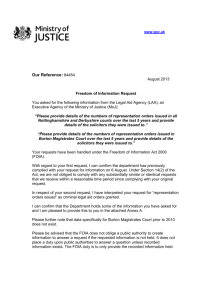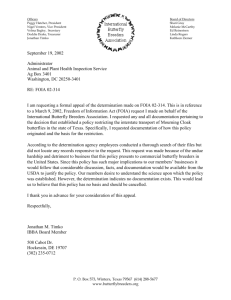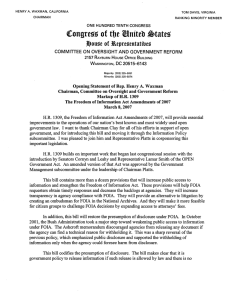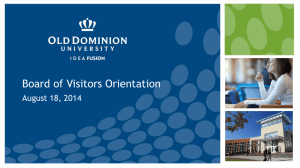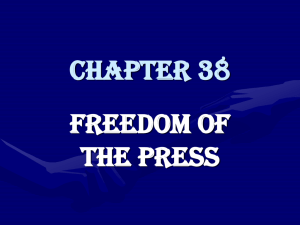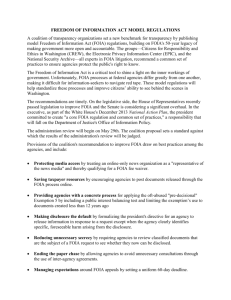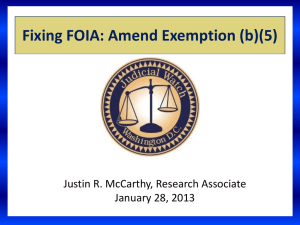The Evolving Ethics of Public Data Creation & Dissemination Information Technology Workshop
advertisement
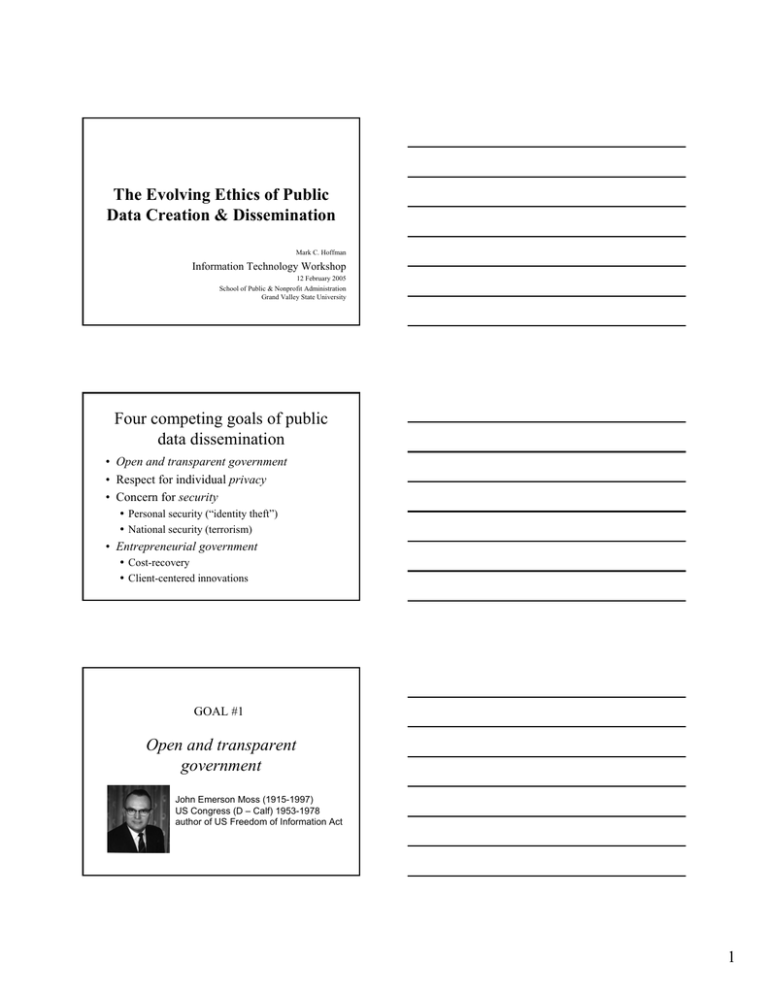
The Evolving Ethics of Public Data Creation & Dissemination Mark C. Hoffman Information Technology Workshop 12 February 2005 School of Public & Nonprofit Administration Grand Valley State University Four competing goals of public data dissemination • Open and transparent government • Respect for individual privacy • Concern for security Personal security (“identity theft”) National security (terrorism) • Entrepreneurial government Cost-recovery Client-centered innovations GOAL #1 Open and transparent government John Emerson Moss (1915-1997) US Congress (D – Calf) 1953-1978 author of US Freedom of Information Act 1 US Freedom of Information Act • 1966 FOIA requires that a US federal agency* disclose public records once a proper request has been made. • Supreme Court: “the basic purpose of the FOIA is to ensure an informed citizenry, vital to the functioning of a democratic society, needed to check against corruption and to hold the governors accountable to the governed.” NLRB v. Robbins Tire & Rubber * does not apply to records held by Congress, the courts, or by state or local government agencies US 1996 Electronic FOIA • Downloading data is NOT creation of a new record • Agency cannot limit format -- must make REASONABLE efforts to provide in requested format • Agency must have commonly requested material available in “electronic reading room” US copyright law § 105. Subject matter of copyright: United States Government works “Copyright protection under this title is not available for any work of the United States Government, but the United States Government is not precluded from receiving and holding copyrights transferred to it by assignment, bequest, or otherwise.” 2 Michigan FOIA • Michigan: requires that a Michigan public body disclose public records once a proper request has been made. • Currently 23 listed exemptions • Response to FOIA request must be made within 5 business days • Fee are limited to cost of searching, duplicating and mailing (including labor and materials) • Creation of “new public record” is not required Farrell v City of Detroit (1995) • Are computer tapes public records that are subject to disclosure under Michigan FOIA? – Detroit News sought public computer records of property tax payers – City of Detroit offered only hard copy – Court ruled that FOIA created right to access public record itself, not just information contained in the record Farrell v Detroit, 209 Mich App 7; 530 NW2d 105 (1995). Zeeff v. City of Ann Arbor (1994) • Is creating a electronic data extract a “new record” not required by FOIA? – Jon Zeeff made FOIA request to Ann Arbor data on street conditions in an electronic format. – Ann Arbor said requested data is not kept in an individual file, so request was for a “new record.” – Court ruled that extracting data was not the creation of a “new public record” as defined by FOIA. Zeeff v. City of Ann Arbor, No. 93-1548-CZ (Mich. Cir. Ct. 1994). 3 GOAL #2 Privacy George Orwell (1903-1950) British author wrote 1984, Animal Farm Privacy in common law • • • • violation of personal isolation disclosure of upsetting private facts characterizing a person in a false light using a person’s name or likeness without permission US Privacy Act of 1974 individuals can: inspect and correct their stored personal information learn how their personal information is use consent to secondary uses of their personal information 4 US Electronic Communications Privacy Act (ECPA) of 1986 • makes it illegal to intercept electronic messages sent over public systems without a search warrant. • allows employers to intercept employees email if: – notice is given – company believes its interests are in jeopardy Computer Matching and Privacy Protection Act of 1988 • Computerized comparison of information from different sources to determine eligibility for Federal benefit programs. – Subjects must receive notice and can refute adverse information – require agency’s to establish Data Protection Boards • Amended 1990 • Office of Management and Budget memorandum, 2000 Driver’s Privacy Protection Act of 1994 State DMVs may never disclose: individual's photographs, SS #, driver ID #, medical / disability information rarely disclose: name, address, telephone # Can disclose: vehicular accidents, driving violations, driver's status, zip code 5 Privacy impact assessments • Evaluate and build privacy protection into new information systems before the system is developed. • Adopted as part of E-Government Reform Act of 2002 OMB memorandum on Web privacy (1999-2000) • Agencies must – establish clear privacy policies for its web activities, – post those policies – comply with those policies. • Agency contractors should also comply with those policies. • No specific policies required Privacy exemptions in Mich FOIA • Specific personal information about an individual if the release would constitute a clearly unwarranted invasion of that individual's privacy. • Records which if disclosed would violate the Family Educational Rights and Privacy Act of 1974 (primarily student records). • Medical, counseling or psychological facts which would reveal an individual’s identity • Crime Victims Rights Act of 2000 6 GOAL #3 Security John Ashcroft (b. 1948) US Attorney General 2001-2005 Preamble to Constitution We the people of the United States, in order to form a more perfect union, establish justice, insure domestic tranquility, provide for the common defense, promote the general welfare, and secure the blessings of liberty to ourselves and our posterity, do ordain and establish this Constitution for the United States of America. 1. National Security • Exemptions to US FOIA • Deletion of potentially risky information from Internet • Total Information Awareness project 7 National Security exemptions to US FOIA • FOIA exemption – “This section does not apply to … an agency conducting a lawful national security intelligence investigation” • Central Intelligence Agency Information Act of 1984 • Ashcroft FOIA Memorandum, October 2002 – “sound legal basis” replaced “foreseeable harm” standard. – Promised DOJ would back refusals • Proposed Domestic Security Enhancement Act of 2003 ??? Deletion of Internet information • Post 9/11, OMB watch has identified 18 instances where federal or state agencies have removed information from their web pages –Department of Energy –EPA –US Geological Survey –Nuclear Regulatory Commission –The National Archives and Records Administration –State of New Jersey – NASA –State of Florida –State of Pennsylvania Total Information Awareness • DoD project to build database to identify potential foreign terrorist threats by seeking patterns in transactions data like credit card bills and travel records. • “would not require the collection of any data currently protected under privacy law” • Not aimed at Americans 8 2. Identity Theft • open a new credit card account, using your name, date of birth, and SS#. • call your credit card issuer and, pretending to be you, change the mailing address. • get cellular phone in your name. • open a bank account in your name and write bad checks on that account. -FTC Michigan law • Exemption from FOIA: “Records that would disclose the social security number of an individual.” • Michigan penal code (1931) Sec. 750.285. A person shall not obtain or attempt to obtain personal identity information of another person with the intent to unlawfully use that information … Public safety / identity theft security exemption in Mich FOIA • Public Safety – Investigating records compiled for law enforcement purposes… – Records of a public body's security measures. • Personal Security – Records that would disclose the social security number of an individual. 9 GOAL #4 Entrepreneurial Government David Osborne Author of Reinventing Government and The Price of Government US Information Reform Act of 1986 • Prices cannot be assigned to the information itself, but to time spent searching (i.e. not market price) • Searches < 2 hours & 100 pages are free • Allows distinctions based on how the information will be used (not allowed under FOIA) – Commercial users are charged higher fees for information searches. – Non-commercial interests are charged a minimal fee (usually the cost to provide the data) E-government Reform Act 2002 • allows agency and its contractor to retain portion of savings from “technology innovations” • establishes – Office of Electronic Government to removing information barriers to federal data and services. – Chief Information Officers Council • mandates public comment periods when deciding what information to publish online. • requires “privacy impact assessment“ on new data systems and projects 10 Cost recovery potential Limited by: FOIA Lack of copyright US Geological Survey (2001) has entered into business relationships with private firms Cost recovery in states Can sell data: e.g., Alaska, Kentucky FOIA applies: e.g., Vermont, NJ “Enhanced Access” provision: e.g., Michigan Michigan's 1996 Enhanced Access to Public Records Act "Reasonable fee” means a charge calculated to enable a public body to recover over time only those operating expenses directly related to the public body's provision of enhanced access. "Operating expenses" include, but are not limited to, the direct cost of purchasing, creating, compiling, storing, maintaining, processing, upgrading, or enhancing information or data in a form available for enhanced access, including the cost of computer hardware and software, systems development, employee time, and the actual cost of supplying the information or record in the form requested by the purchaser. 11 Should electronic data be exempted from FOIA? • YES say governments who want to sell data for market price • NO say information industry companies that want to get government information cheaply, repackage it, and sell it 12
